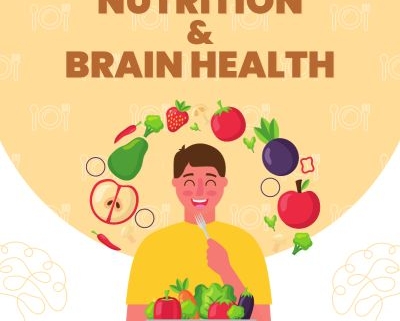Nutrition and Brain Health
Smart study habits aren’t the only way to ensure you do well in school. Proper nutrition can have a positive impact on student performance, particularly when it comes to improving your learning, memory, and cognitive function. Conversely, poor nutrition can negatively impact everything from your ability to focus to your quality of sleep. Read on to learn more about nutrition and brain health.
The Basics of Proper Nutrition
- A balanced, nutritious diet helps you stay healthy and avoid chronic illnesses. The best way to have a nutritious diet, according to the Dietary Guidelines for Americans, is to focus on eating a variety of nutrient-dense food and beverages in each food group. The different food groups are fruits, vegetables, grains, protein, and dairy.
- Nutrient-dense foods have a variety of vitamins, minerals, and other necessary nutrients with little to no added sugar, sodium, or saturated fats.
- A balanced diet includes:
- Vegetables of all types and colors—starchy vegetables like potatoes, dark leafy greens like kale and spinach, bell peppers, cauliflower, broccoli, beans, peas, and lentils.
- Fruits, especially whole fruits like apples, oranges, bananas, grapes, mangos, pineapple, cherries, berries, and more.
- Grains, at least half of which are whole grain.
- Dairy, including fat-free or low-fat milk, yogurt, cheese, and/or lactose-free versions, and fortified soy beverages.
- Protein, including lean meats, eggs, seafood, beans, peas, lentils, nuts, seeds, and soy products.
How Does Nutrition Impact Brain Health?
Your brain needs food to function. It’s constantly analyzing information your body takes in through your senses of sight, smell, hearing, touch, and taste. It uses this information to think and solve problems. Even at night, your brain is working! This is why it’s so important to feed your brain properly.
Each food group is necessary for proper brain function:
- Healthy fats especially omega-3 fatty acids, support memory and learning. Cells and a majority of your brain are made up of fat as well.
- Proteins are necessary to produce neurotransmitters. Neurotransmitters are essential for learning, memory, and emotional regulation.
- Carbohydrates are digested into glucose which provides energy to your brain.
- Fruits and vegetables are filled with beneficial micronutrients, like antioxidants. Antioxidants found in fruits like berries can reduce inflammation, and help the brain generate cells and neurotransmitters which boost learning and memory.
According to a scientific analysis, proper cognitive development in infants and children relies on adequate nutrition. Some of the things found to be beneficial were increased iron and multi-nutrients, as well as increased consumption of fish.
Just as healthy fats improve cognitive function, excess consumption of saturated fats leads to cognitive decline and negatively affects children’s memory. Saturated fats are found in foods like butter, ghee, cream, and coconut oil.
Diets high in fat and sugar can seriously alter the brain regions used for memory, learning, and reward systems. High-fat and high-sugar foods take over the reward system in your brain making you want more and more, which can lead to overeating and cognitive decline.
Other Ways Nutrition Can Have an Impact
Sleep
Sleep is essential to helping children and adolescents grow and develop. It’s also important for memory and learning. Nutrient-dense foods help children have better quality sleep, while foods lacking nutrients like processed foods and fast foods are associated with poorer sleep quality in children. Soda consumption is also associated with less sleep.
Mood & Emotions
Overeating, eating a diet high in fat, or eating a diet that does not meet nutritional needs can cause inflammation in your cells, particularly in the parts of your brain that control cognition and emotion. This is how a poor diet can lead to poor emotional regulation and even depressive symptoms. Scientists observed this even in young children, which is why starting good eating habits and proper nutrition at a young age is so important.
Good nutrition gives your brain the VIP treatment it deserves! And when it comes to acing your classes, tutoring can put your well-nourished brain to the test by reviewing material and learning new concepts. By feeding your brain right and getting that extra help when needed, you’re setting yourself up for academic success!
Sign Up for Tutoring Today!
Learn more or schedule your first session by calling or emailing us today.
Sources
U.S. Department of Agriculture and U.S. Department of Health and Human Services. Dietary Guidelines for Americans, 2020-2025. 9th Edition. December 2020. Available at DietaryGuidelines.gov
U.S. Department of Agriculture. (n.d.). What is MyPlate? https://www.myplate.gov/eat-healthy/what-is-myplate
Roberts, M., Tolar-Peterson, T., Reynolds, A., Wall, C., Reeder, N., & Rico Mendez, G. (2022). The Effects of Nutritional Interventions on the Cognitive Development of Preschool-Age Children: A Systematic Review. Nutrients, 14(3), 532. https://doi.org/10.3390/nu14030532
Naveed, S., Lakka, T., & Haapala, E. A. (2020). An Overview on the Associations between Health Behaviors and Brain Health in Children and Adolescents with Special Reference to Diet Quality. International Journal of Environmental Research and Public Health, 17(3), 953. https://doi.org/10.3390/ijerph17030953
Holmes, J. F., St. Laurent, C. W., & Spencer, R. M. C. (2021). Unhealthy diet is associated with poor sleep in preschool-aged children. Journal of Genetic Psychology, 182(5), 289–303. https://doi.org/10.1080/00221325.2021.1905598
Ahmad F, Hasan H, Abdelhady S, Fakih W, Osman N, Shaito A and Kobeissy F (2021) Healthy Meal, Happy Brain: How Diet Affects Brain Functioning. Front. Young Minds. 9:578214. doi: 10.3389/frym.2021.578214
Spencer, S.J., Korosi, A., Layé, S. et al. Food for thought: how nutrition impacts cognition and emotion. npj Sci Food 1, 7 (2017). https://doi.org/10.1038/s41538-017-0008-y



